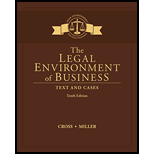
(a)
Case summary:The company D made a product CC. The companies C and D had one-third of the market share in the product CC and agreed to fix the price of the product. After a few years, person R became the president of D and decided to influence other competitors to rejoin the conspiracy. After an investigation by US Department of Justice, the court convicted R for conspiracy and for the violation of section 1 of the Sherman act.
To find: The justification for the enhancement of the punishment of R on the basis of his position as a supervisor or a manager.
(b)
Case summary: The company D made a product choline chloride. Both companies C and D had one-third of the market share in the product and agreed to fix the price of the product. The person R became the president of D and decided to influence other competitors to join the conspiracy. After an investigation by US Department of Justice, the court convicted the R for conspiracy and for the violation of Section 1 of the Sherman act.
To find: The unethicalness in the decision of R and other competitors.
Case summary: The company D made a product choline chloride. Both companies C and D had one-third of the market share in the product and agreed to fix the price of the product. The person R became the president of D and decided to influence other competitors to join the conspiracy. After an investigation by US Department of Justice, the court convicted the R for conspiracy and for the violation of Section 1 of the Sherman act.
To find: The way R might have behaved ethically.
Want to see the full answer?
Check out a sample textbook solution
Chapter 27 Solutions
The Legal Environment of Business: Text and Cases (MindTap Course List)
- Answer this general accounting questionarrow_forwardDJ Chase carries portfolios of both trading securities and available-for-sale securities. At the end of 2018 and 2017, the trading securities were valued at $468.4 billion and $595.6 billion, respectively; and the available-for-sale securities were valued at $205.9 billion and $85.4 billion, respectively. Together, the investments comprise about 25 percent of the company's total assets as of December 31, 2018. Unrealized gains reported on the 2018 income statement totaled $9.9 billion. Trading securities are carried on the balance sheet at market value. Compute the net decrease in the investment in trading securities during 2018.arrow_forwardPlease provide this question solution general accountingarrow_forward
- Provide answer general accountingarrow_forwardOn January 1, 2021, Nohara Inc, had cash and share capital of Yen 60,000,000. At that date, the company had no other asset, liability, or equity balances. On January 2, 2021, it purchased for cash Yen 20,000,000 of equity securities that it classified as non-trading. It received cash dividends of Yen 4,500,000 during the year on these securities. In addition, it has an unrealized holding gain on these securities of Yen 6,500,000 net of tax. Determine the following amounts for 2021: a) Net income. b) Comprehensive income. c) Other Comprehensive Income, and d) Accumulated other comprehensive income (end of 2021).arrow_forwardCORRECT ANSWER✅arrow_forward
 BUSN 11 Introduction to Business Student EditionBusinessISBN:9781337407137Author:KellyPublisher:Cengage Learning
BUSN 11 Introduction to Business Student EditionBusinessISBN:9781337407137Author:KellyPublisher:Cengage Learning Essentials of Business Communication (MindTap Cou...BusinessISBN:9781337386494Author:Mary Ellen Guffey, Dana LoewyPublisher:Cengage Learning
Essentials of Business Communication (MindTap Cou...BusinessISBN:9781337386494Author:Mary Ellen Guffey, Dana LoewyPublisher:Cengage Learning Accounting Information Systems (14th Edition)BusinessISBN:9780134474021Author:Marshall B. Romney, Paul J. SteinbartPublisher:PEARSON
Accounting Information Systems (14th Edition)BusinessISBN:9780134474021Author:Marshall B. Romney, Paul J. SteinbartPublisher:PEARSON
 International Business: Competing in the Global M...BusinessISBN:9781259929441Author:Charles W. L. Hill Dr, G. Tomas M. HultPublisher:McGraw-Hill Education
International Business: Competing in the Global M...BusinessISBN:9781259929441Author:Charles W. L. Hill Dr, G. Tomas M. HultPublisher:McGraw-Hill Education





